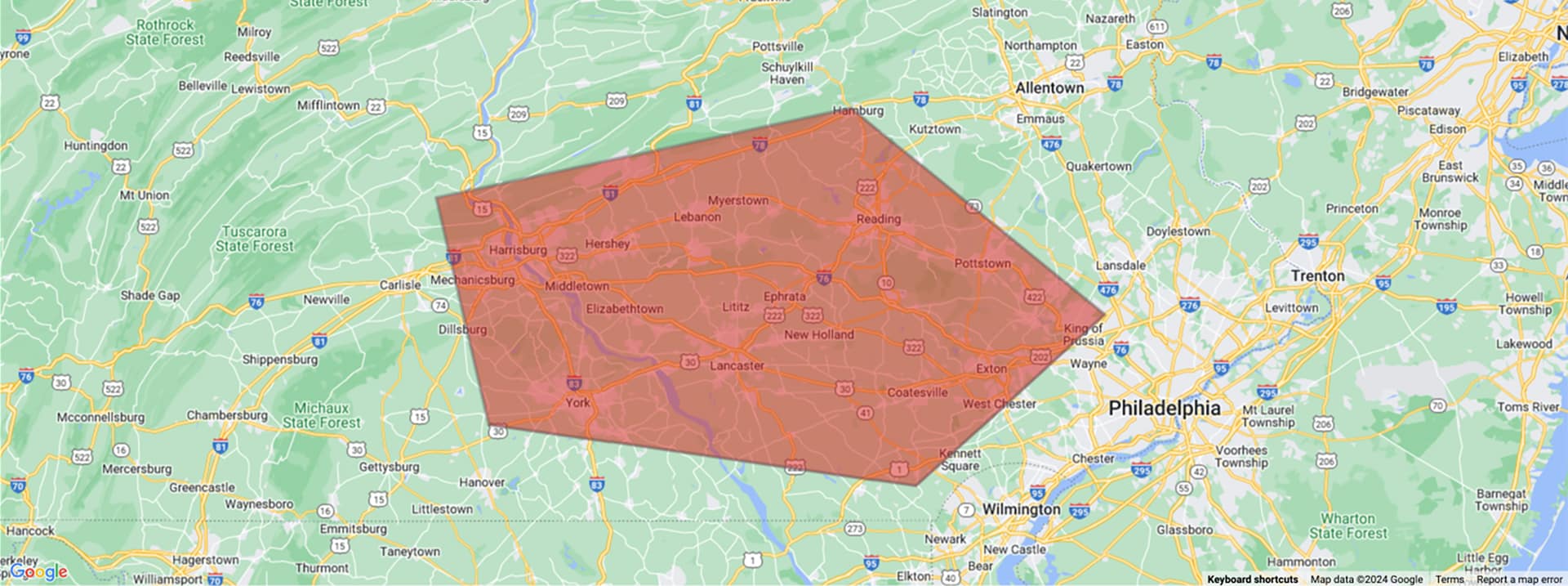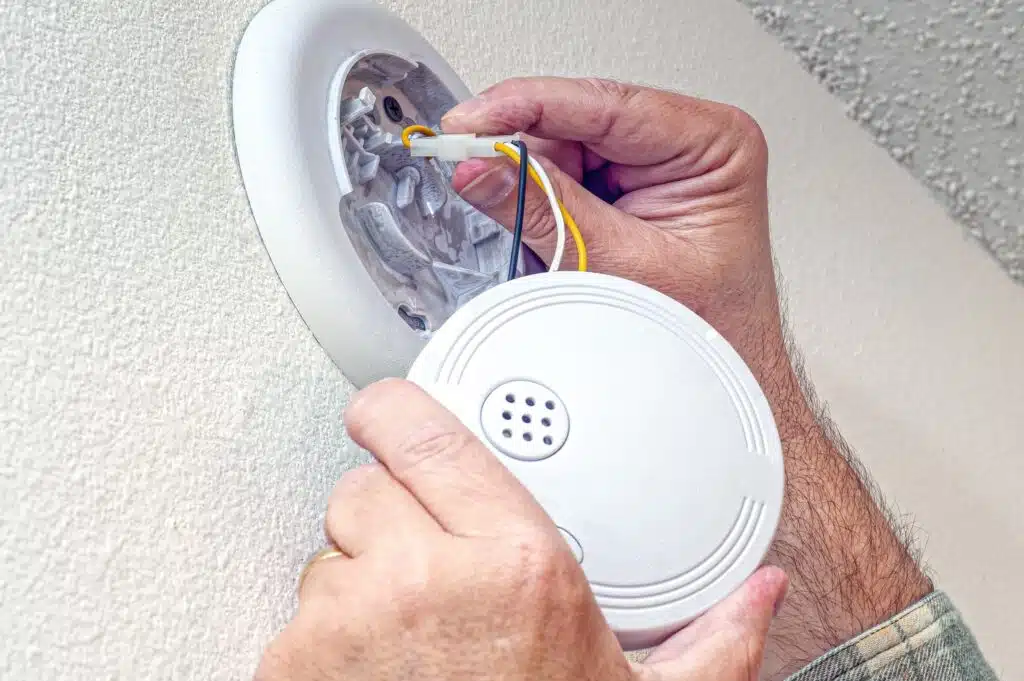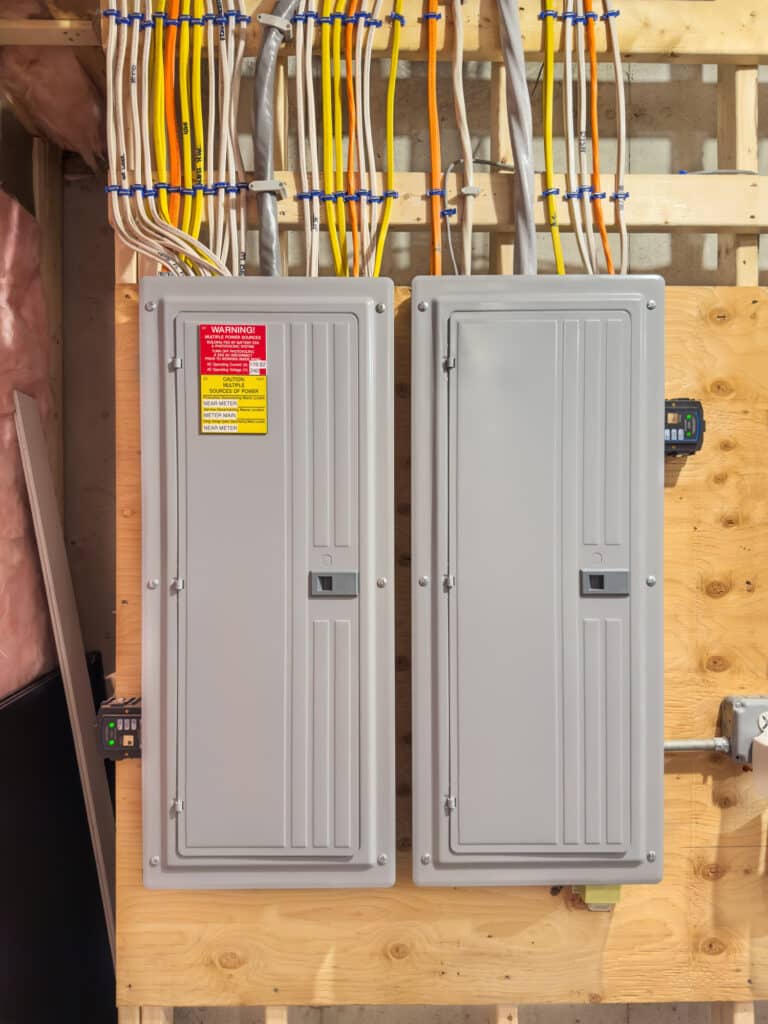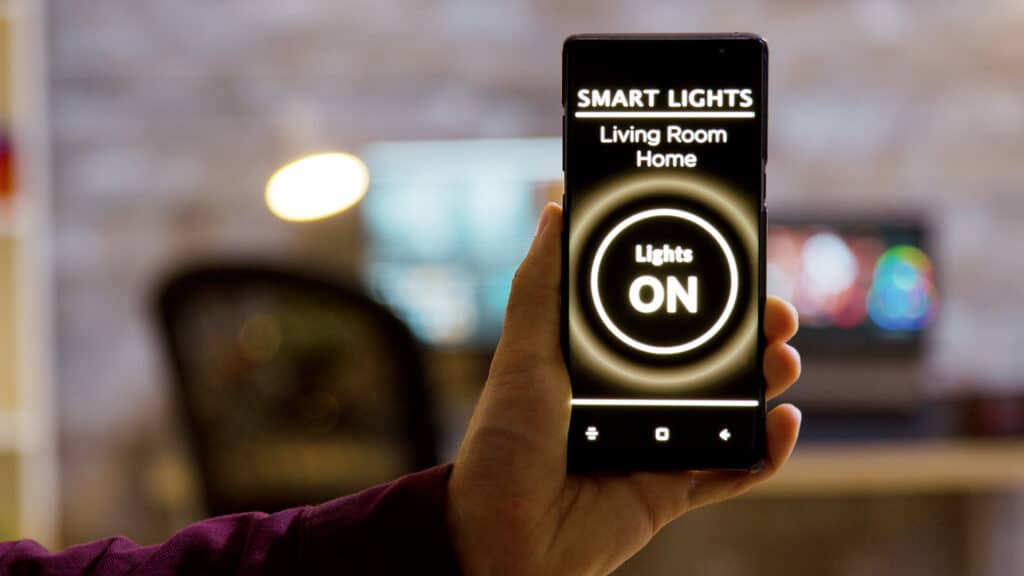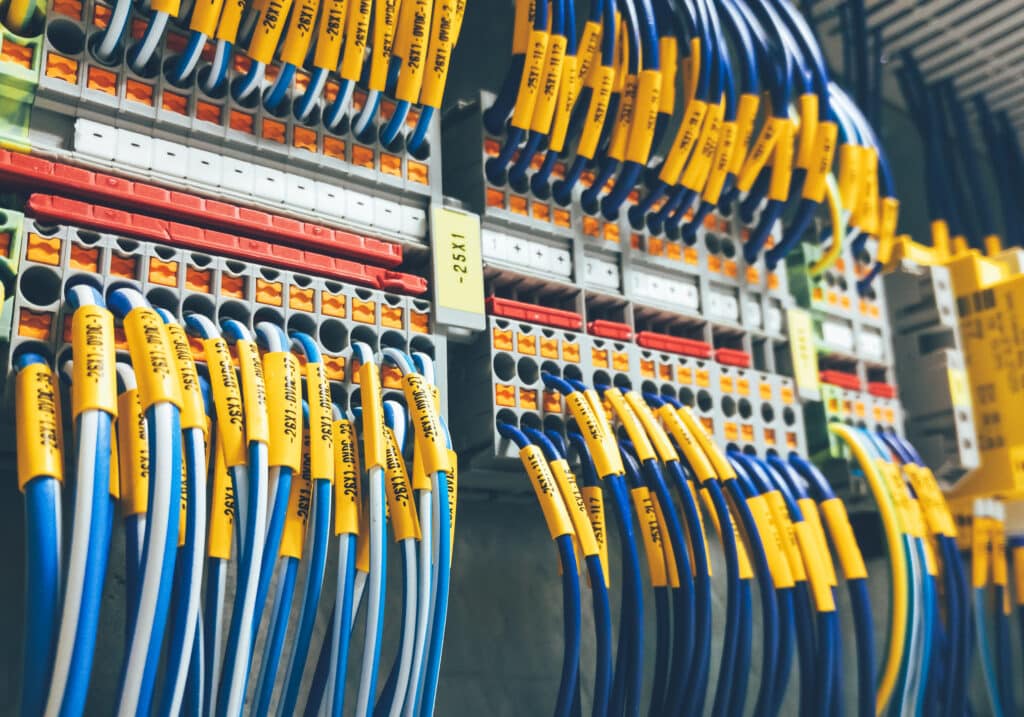Winter is the peak season for electrical fires due to the increased use of heaters, holiday lights, and other devices. Here’s how to keep your home safe:
- Avoid Overloading Circuits: Spread devices across multiple outlets and use power strips with circuit breakers.
- Inspect Heating Devices: Regularly check space heaters, electric blankets, and other heating devices for signs of damage and never leave them unattended.
- Check Electrical Cords: Replace frayed or damaged cords immediately.
- Use GFCIs: Install Ground Fault Circuit Interrupters in high-risk areas like kitchens and bathrooms.
- Schedule Professional Inspections: An annual check by an electrician can catch potential hazards before they become serious.
Stay safe by taking these precautions to prevent electrical fires this winter.

Did you know that winter is the most dangerous time of year for electrical fires? As the days get colder, we rely more on heaters, holiday lights, and extra gadgets, all of which can increase the risk of a fire in your home.
But don’t worry—avoiding these dangers is easier than you think. With a few simple precautions, you can keep your family safe and warm without the fear of an unexpected fire. Let’s dive into why these fires are more common in winter and how you can prevent them.
Why Electrical Fires Are More Common in Winter
When the temperature drops, we all tend to crank up the heat, plug in extra devices, and set up holiday lights. All of these things put extra strain on your home’s electrical system.
Winter means more time indoors, so we naturally use more electricity. Whether it’s the space heater warming up your bedroom or the holiday lights twinkling on your front porch, all these devices can overwork your circuits. Plus, cold weather can make wires and cords brittle, increasing the chances of a short circuit or a spark that could lead to a fire.
Additionally, heating devices like space heaters, electric blankets, and even Christmas lights are more likely to be used during the colder months. If these devices are old, damaged, or used incorrectly, they can become a fire hazard.
And let’s not forget about the dry indoor air that comes with winter. Dry conditions can make it easier for sparks to ignite, turning a small electrical issue into a big problem. So, it’s no surprise that the risk of electrical fires rises when the temperature falls.
Common Causes of Winter Electrical Fires
Winter is a time to stay cozy, but it’s also a time to be cautious, especially when it comes to electrical safety. Understanding the common causes of electrical fires during this season can help you avoid them and keep your home safe.
Overloading Circuits
One of the biggest culprits behind winter electrical fires is overloaded circuits. When you plug too many devices into a single outlet or power strip, it can overwhelm your home’s electrical system.
This overload can cause the wires to overheat, eventually leading to a fire. It’s tempting to plug in everything from your space heater to your holiday lights, but overloading your circuits is a serious fire risk.
To prevent this, always be mindful of how many devices are connected to a single outlet, and use power strips with built-in circuit breakers for added safety.
Faulty Heating Devices
Heating devices like space heaters and electric blankets are a winter staple, but if they’re old or faulty, they can be dangerous. These devices can easily overheat, especially if left on for long periods or if they’re placed near flammable materials.
If they don’t have an automatic shut-off feature, they can become a serious fire hazard. It’s important to regularly check these items for any signs of damage, such as frayed cords or malfunctioning switches.
Always use them according to the manufacturer’s instructions, and never leave them unattended while they’re on.
Worn-Out Electrical Cords
Worn-out electrical cords are another common cause of winter fires. Over time, the insulation around your cords can become frayed or damaged, exposing the wires inside. This exposure can lead to sparks, which can easily ignite nearby flammable materials like curtains, rugs, or even paper.
Always inspect your cords before using them, especially during the winter months when you may be using them more frequently. If you notice any signs of wear and tear, such as visible wires or a loose connection, replace the cord immediately to reduce the risk of a fire.
Preventive Measures to Avoid Electrical Fires
Now that we know the common causes of electrical fires in winter, let’s talk about how to prevent them. By taking some simple steps, you can significantly reduce the risk of a fire in your home and enjoy the winter season safely.
Safe Use of Heating Devices
Heating devices like space heaters and electric blankets are essential for staying warm during the winter, but they can also be dangerous if not used properly. Always place space heaters on a flat, stable surface and keep them away from flammable materials like curtains or bedding.
Make sure the heater has an automatic shut-off feature that activates if it tips over. Never leave heating devices unattended while they’re on, and always turn them off before leaving the room or going to sleep. Following these guidelines can help you stay warm without risking a fire.
Proper Installation of Holiday Decorations
Holiday decorations, especially lights, can be a joy to set up, but they can also pose a fire risk if not installed correctly. Always check your lights for frayed wires or broken bulbs before hanging them.
Use lights that are rated for outdoor use if you plan to display them outside, and never connect more than three strings of lights together, as this can overload your circuits.
Make sure to use hooks or insulated staples to secure your lights rather than nails or tacks, which can damage the wires. By installing your decorations safely, you can enjoy a festive home without the worry of a fire.
Avoid Overloading Electrical Outlets
Overloading electrical outlets is a common mistake that can lead to fires, especially during the winter when we tend to use more electrical devices. To prevent this, avoid plugging too many devices into a single outlet or power strip.
Instead, spread out your devices across multiple outlets to distribute the load more evenly. If you’re using a power strip, choose one with a built-in circuit breaker, which will shut off automatically if it becomes overloaded. Being mindful of how you use your outlets can go a long way in preventing electrical fires.
Regular Inspection of Electrical Cords
Regularly inspecting your electrical cords is an important step in preventing fires. Over time, cords can become damaged from wear and tear, exposure to pets, or simply from being bent or twisted too much.
Check your cords for any signs of damage, such as fraying, cracks, or exposed wires. If you find any damage, replace the cord immediately rather than trying to repair it, as a damaged cord can easily spark a fire. Keeping your cords in good condition will help ensure your home stays safe throughout the winter.
Importance of Using Ground Fault Circuit Interrupters (GFCIs)
Ground Fault Circuit Interrupters (GFCIs) are essential safety devices that can help prevent electrical fires, especially in areas where water and electricity are close together, like kitchens and bathrooms.
GFCIs work by shutting off the power if they detect an imbalance in the electrical current, which can happen if there’s a short circuit or if the circuit is overloaded.
If your home doesn’t already have GFCIs installed, consider having an electrician install them in high-risk areas. Using GFCIs is a simple but effective way to reduce the risk of an electrical fire.

Routine Maintenance Tips
Routine maintenance is key to preventing electrical fires, especially during the winter months when your electrical system is under more stress. By staying on top of these tasks, you can catch potential issues before they become serious problems.
Regularly Inspect Electrical Systems
Regular inspections of your home’s electrical systems are crucial to ensuring everything is working as it should. Take the time to check your circuit breakers, outlets, and electrical panels for any signs of wear or damage.
If you notice anything unusual, such as flickering lights, tripped breakers, or warm outlets, it might indicate a problem that needs professional attention.
Don’t hesitate to call an electrician to inspect and fix any issues. A little proactive care can go a long way in keeping your home safe.
Safe Use of Extension Cords
Extension cords are handy, especially during the holidays when you need to plug in extra lights or decorations. However, they can also be a fire hazard if not used correctly.
Always use extension cords that are rated for the power level of the devices you’re plugging in. Never use a damaged or frayed cord, and avoid running cords under rugs or furniture where they can overheat.
Also, remember that extension cords are meant for temporary use; if you find yourself relying on them regularly, it might be time to consider installing additional outlets in your home.
Keep Electrical Devices Clean and Dust-Free
Dust may seem harmless, but when it accumulates on electrical devices, it can increase the risk of a fire. Dust and debris can block ventilation openings, causing devices to overheat.
Make it a habit to regularly clean your appliances, heaters, and other electrical devices to keep them dust-free. Use a soft, dry cloth to wipe down surfaces, and avoid using water or cleaning solutions that could damage the electrical components. Keeping your devices clean is a simple yet effective way to reduce the risk of a fire.
Importance of Professional Inspections
While regular maintenance and careful use of electrical devices are important, nothing beats the assurance that comes from a professional inspection. Having a professional electrician check your home’s electrical system can help identify potential hazards that you might miss.
Annual Electrical Safety Check
Scheduling an annual electrical safety check is a smart move, especially before the winter season kicks in. During this inspection, an electrician will thoroughly examine your home’s wiring, outlets, circuit breakers, and other critical components.
They’ll look for any signs of wear, damage, or potential fire hazards, ensuring everything is up to code. This annual checkup can provide peace of mind, knowing that your electrical system is safe and ready to handle the increased demands of winter.
When to Call an Electrician
Knowing when to call an electrician can make all the difference in preventing a potential fire. If you notice warning signs like flickering lights, frequently tripped breakers, or outlets that feel warm to the touch, it’s time to bring in a professional.
Even minor issues, such as a buzzing noise from an outlet or a slight burning smell, shouldn’t be ignored. These could be early indicators of a serious problem that needs immediate attention. Don’t try to fix electrical issues yourself—calling a professional electrician is always the safer and smarter choice.

Emergency Preparedness
Even with the best precautions, it’s essential to be prepared for emergencies. Knowing what to do in the event of an electrical fire can help you act quickly and safely, minimizing damage and keeping your family safe.
What to Do in Case of an Electrical Fire
If an electrical fire breaks out in your home, the first thing to remember is not to panic. Quickly assess the situation and, if it’s safe, try to unplug the device or turn off the power at the circuit breaker.
Never use water to extinguish an electrical fire, as water conducts electricity and could make the situation worse. Instead, use a Class C fire extinguisher, which is designed for electrical fires.
If the fire is small and manageable, you might be able to put it out on your own. However, if the fire spreads or you feel unsafe, evacuate the area immediately and call 911.
Importance of Smoke Alarms
Smoke alarms are your first line of defense in the event of a fire, including electrical fires. Make sure you have working smoke alarms installed on every level of your home, especially near bedrooms and in high-risk areas like the kitchen and living room.
Test your smoke alarms monthly and replace the batteries at least once a year. Consider using interconnected smoke alarms, so when one alarm sounds, they all do. This gives you and your family more time to react and get to safety in the event of a fire.
Creating an Emergency Exit Plan
Having an emergency exit plan in place can save lives in the event of a fire. Sit down with your family and discuss escape routes from every room in the house. Identify two ways out of each room and ensure everyone knows where the exits are.
Practice your plan regularly so that everyone knows what to do and where to go if a fire occurs. Make sure your plan includes a designated meeting spot outside the home where everyone can gather once they’ve safely evacuated.
Being prepared with an emergency exit plan can help you and your family escape quickly and safely if electrical fires ever happen.
Keep Your Home Safe This Winter with Mister Sparky of Lancaster
Worried about electrical fires in your home this winter? Don’t take any chances—trust the experts at Mister Sparky of Lancaster to ensure your electrical system is safe and sound.
Serving Lancaster, Harrisburg, and Lebanon, PA, our professional electricians are ready to help you stay safe all season long. Schedule your professional inspection today and enjoy peace of mind knowing your home is protected.
FAQs About Electrical Fires
Can space heaters cause electrical fires?
Yes, space heaters are one of the most common causes of electrical fires during winter. If used improperly or left unattended, they can overheat and ignite nearby materials. Always keep space heaters away from flammable items and turn them off when not in use.
How often should I inspect my home’s electrical system?
It’s recommended to inspect your home’s electrical system at least once a year, especially before winter. Regular inspections help catch potential issues that could lead to electrical fires. Call an electrician if you notice any signs of trouble, like flickering lights or warm outlets.
Are power strips safe to use with multiple devices?
Power strips can be safe, but they must be used correctly to prevent electrical fires. Avoid overloading them with too many high-wattage devices. Choose power strips with built-in circuit breakers and ensure they’re in good condition.
What should I do if I smell burning but don’t see a fire?
If you smell something burning but don’t see smoke or flames, it could be an early sign of an electrical fire. Turn off the power to the area and unplug any devices. Don’t use that outlet or appliance until it’s been inspected by a professional.
Is it necessary to have an electrician inspect my home if everything seems fine?
Yes, it’s wise to have an electrician perform an annual inspection, especially before winter. Many issues that cause electrical fires aren’t immediately noticeable. A professional inspection can help ensure your home is safe from hidden dangers.






